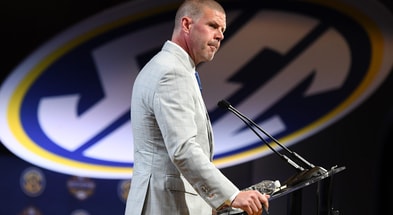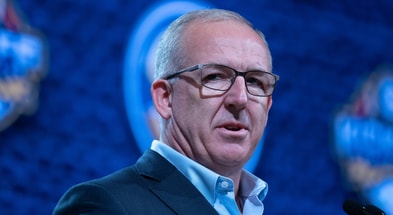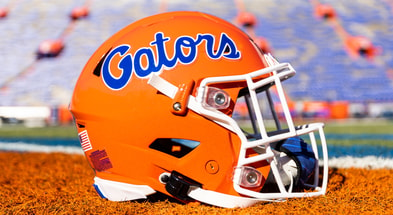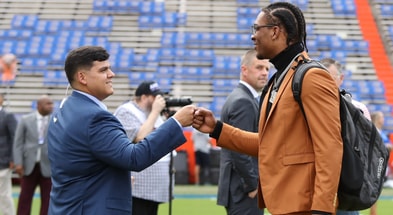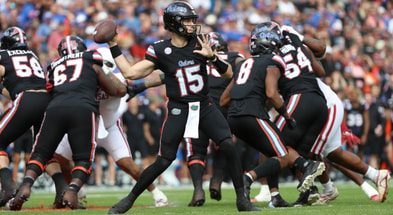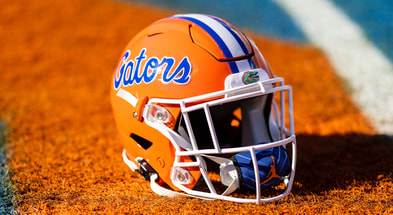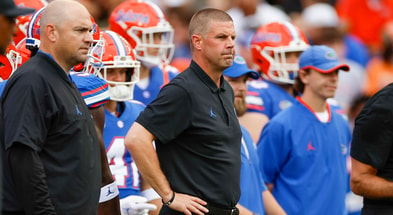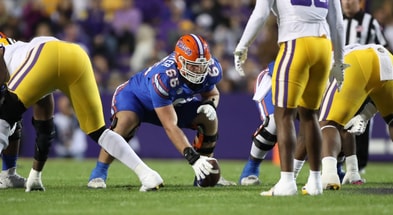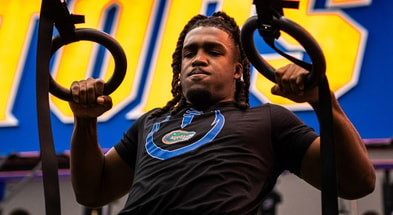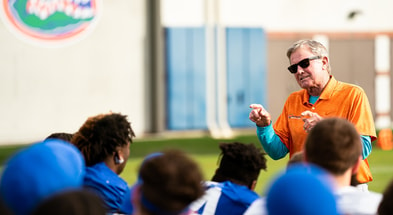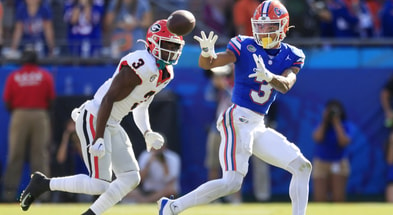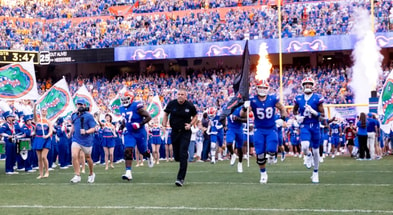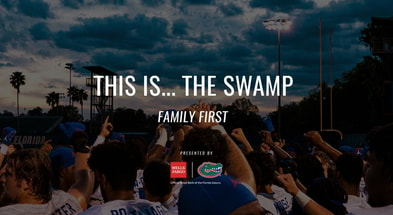Two defining moments that shaped Billy Napier as a coach and man
Life’s challenges are not supposed to paralyze you, they’re supposed to help you discover who you are, wrote Bernice Johnson Reagon.
For Florida’s Billy Napier, the 42-year-old has been through two challenging periods in his life that shaped him into the coach and man he is today.
During his interview for the UF job, Napier discussed those experiences with athletics director Scott Stricklin.
“He told me the two things that had most impacted him as a coach were getting fired at Clemson and his dad’s passing,” Stricklin told Gators Online. “He said both of those things have really impacted who he is.”
Napier’s humbling experience
Napier started his coaching career as a graduate assistant at Clemson from 2003-04. He returned to the Tigers in 2006 as their tight ends coach and recruiting coordinator under Tommy Bowden.
After Clemson took the interim tag off Dabo Swinney following the 2008 regular season, he promoted Napier to offensive coordinator and allowed him to coach his desired position — quarterbacks.
At the age of 29, Napier became the youngest coordinator in the nation and in Clemson history. In his first season as OC, the 2009 Tigers scored a school-record 436 points, collected 54 touchdowns (third-most in school history) and averaged 5.73 yards per play (fourth best).
“Billy was the youngest offensive coordinator in the country when he had that position here in 2009. We won our first Atlantic Division title that year and set records for offensive production,” Swinney said of Napier’s first season. “What we accomplished (in 2016) got its start with that team in 2009 and I am indebted to Billy for the work he put in for our program.”
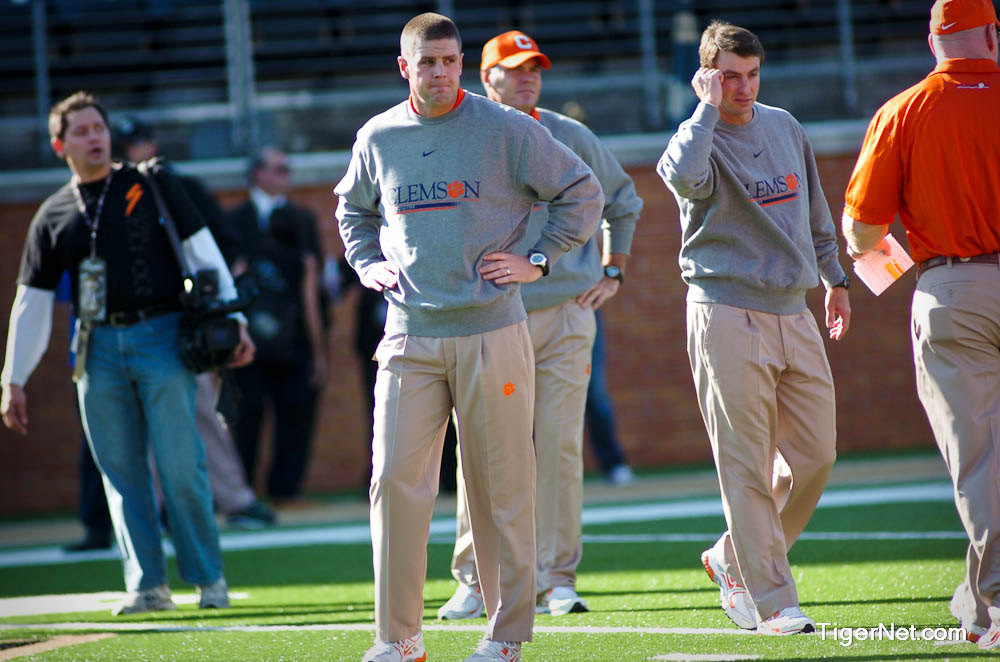
Napier’s first offense at Clemson averaged 362.4 yards and 31.1 points per game. But after being No. 28 nationally in scoring offense, the Tigers dropped to 86th the following season and ranked 88th in total offense.
A year removed from winning its division, Clemson finished tied for fourth in 2010 and suffered the program’s first losing season since 1998. Swinney let Napier go two weeks later.
“It was a unique time in my career. Certainly, I was in a very humbled place, I think anytime that happens to you,” Napier said last month at his UF introductory news conference.
Napier now looks back on his firing as a blessing in disguise. He was 31 at the time and had coached at the same place for seven years.
“Truth be known, I was a young coach with limited exposure. When you are kind of a fast riser and you continue to slowly get hired at a young age, gaining more responsibility, then the rug gets pulled right out from underneath, it is a humbling experience,” Napier told CBS Sports in 2017.
Six weeks after losing his job, Napier received a career-changing phone call from Nick Saban. He asked Napier to join his staff at Alabama as an offensive analyst and picked him up “off the streets.”
Napier learned more under Saban in 2011 than he had in the previous decade. After a season at Colorado State, Napier was rehired by Saban as an assistant and spent four more years in his program, coaching on two title teams.
Napier crossed paths with Swinney twice for the national championship, with Alabama and Clemson splitting the games. Prior to the first matchup, Napier said he held no animosity toward Swinney over his firing and was a better coach because of it.
“More than anything, it’s what allowed me to keep learning and keep looking for ways to improve,” Napier told the Greenville News. “The things I really believe and the things I thought were important, to see that going on at Alabama kind of reinforced what I thought it takes to be successful.”
His father’s fight
Success is to be measured not so much by the position that one has reached in life as by the obstacles which he has overcome, Booker T. Washington wrote.
Following his dismissal from Clemson, it took Napier seven years to get another opportunity to call plays. That came in 2017 when he was hired as Arizona State’s offensive coordinator, a job Swinney endorsed Napier for.
“I am very happy for Billy. He will be a great fit at Arizona State,” Swinney said at the time. “Billy has always been a terrific recruiter and a tireless worker. He grew up around the game.”
His father was Bill Napier, a legend in Georgia high school football coaching. He was Murray County’s head coach from 1991 to 2006, winning 94 games (most in school history) and three region titles.
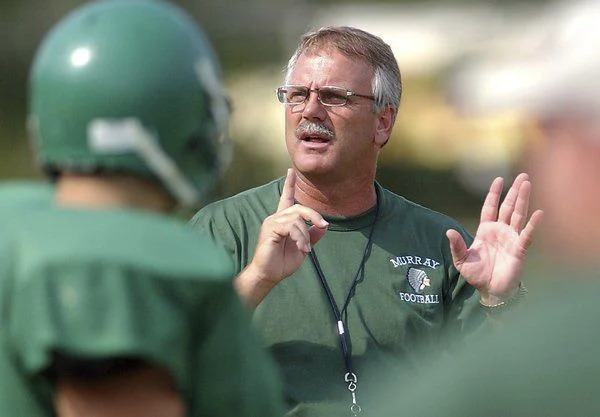
Napier’s father inspired him to coach, but how he battled the incurable Amyotrophic Lateral Sclerosis (ALS) changed his son’s outlook on life. Bill continued coaching as Dalton High School’s offensive coordinator with the disease, calling plays from his wheelchair until he could no longer speak.
“I think that his ability to handle and manage that with impeccable character — he didn’t flinch. And the impressive thing was that his foundation was his faith,” Napier said of his father. “The example that he set, and for not only me. Heck, he inspired a lot of people.”
After his diagnosis in 2013, Bill established a scholarship endowment to help area athletes attend college. He also began texting Bible verses and inspirational messages each day to over 400 people. Many were his former players.
“As a wife of a husband who coached and loved the Lord, that guidance grew into them,” Napier’s mother Pam told Gators Online. “And so he impacted not just our kids, but thousands of kids. When he was sick, he would send out hundreds of Bible verses every day until he couldn’t type with his ALS. And then we did it for him.
“So he had an influence on all kids and his own. And he never wavered. He trusted the Lord and never questioned, ‘Why me?’ Because he knew how he could affect people.”
The last verse he sent out, just a few hours before his death, was Proverbs 16:9. “In your heart you plan your life. But the Lord decides where your steps will take you.”
Bill passed away at age 60 on September 26, 2017.
Napier was in season with Arizona State. His father never got to see Napier become a head coach, first at Louisiana and now Florida, but taught him a valuable lesson that he took into both jobs.
“I think that experience changed my approach,” Napier said of his father’s passing. “I think it made me a better husband. It made me a better father. Certainly made me a better coach. And I think that kind of changed my perspective a little bit.
“I think I really became player focused from that point on, if that makes sense. He taught me life’s about people. And I think we play a great game. Football’s a great game, but it’s a game of people and about people.”
Napier’s final lesson from his father ultimately helped him land the Florida gig. Stricklin had three things he was looking for in a new coach: someone who could bring people together, be a leader of men and run a successful program.
Napier learned the latter from Saban at Alabama, while his people skills and leadership qualities can be traced back to Murray County High School and his childhood.
“I talked about how important culture and relationships needed to be going forward,” Stricklin said. “I think one of Billy’s strengths is relationships with people. And when things aren’t going great, that’s when those relationships help you get through those things.
“You can help someone who’s going through a time or they can help you because you’ve built a reservoir of connection. You’ve got equity with someone. And the term emotional intelligence just keeps coming back to my head. You gotta be able to understand people and read people in order to help people.”



